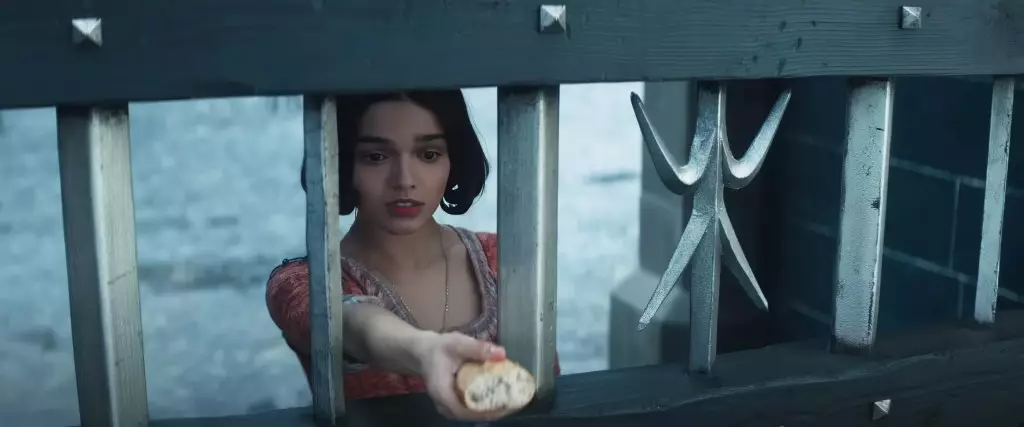Disney’s live-action adaptation of “Snow White” has entered the fray with significant anticipation, a hefty budget of $270 million, and an overwhelming sense of scrutiny. The film, which stars Rachel Zegler, generated $3.5 million from Thursday previews—a lukewarm figure that raises eyebrows in an ever-competitive cinematic landscape. While this number is indeed higher than the previews of past adaptations like “Dumbo” and “Maleficent: Mistress of Evil,” it also raises the question of whether Disney has miscalculated its audience. In an age where family films are often scrutinized not just for their entertainment value but also for their cultural relevance, the early reception appears to be tepid at best.
One key metric for assessing the film’s potential success is its awareness and interest levels. According to sources, “Snow White” has high awareness at 94%, yet interest trails behind at a disappointing 39%. Such a disparity can be detrimental, especially when one considers that peak interest often translates to box office success. Given that it’s spring break—a prime season for family movie outings—Disney finds itself at a crossroads: Will families choose to overlook the controversies surrounding the film’s lead and plot to rediscover a beloved princess?
The Impact of Controversy
Controversies surrounding Rachel Zegler have undoubtedly cast a shadow over Disney’s marketing efforts. Zegler’s outspoken nature—often perceived as antagonistic toward traditional values—may alienate potential audiences who are already cautious about today’s culturally charged climate. The industry’s fixation on whether “red state” families will accept this version of a princess-centric narrative points to a broader cultural discussion. Will they be put off by the perceived modernizations and political undercurrents, or will they cling to nostalgia for the classic tale?
As much as Zegler’s involvement has drawn flak, it’s important to remember that Disney has historically benefitted from the trend of casting rising stars—only for them to generate headlines rather than box office receipts. Yet, just as with “Maleficent” and “Aladdin,” negative reviews from critics typically do not deter family audiences; these Disney films have often opened surprising ways despite mixed receptions.
The Filmmaking Team Behind Snow White
Another layer of complexity is the assembly of talent behind “Snow White.” Directed by Marc Webb, known for his work in romantic comedies like “500 Days of Summer,” this film brings a substantial pedigree. The musical score is by the Oscar-winning duo Pasek and Paul, renowned for their contributions to cinematic hits like “La La Land.” In that context, expectations for the film become even more pronounced. With names associated with popular, well-crafted projects, anything less than a successful outing falls flat against those high standards.
Moreover, this adaptation incorporates modern influences. Although many were quick to draw parallels to other high-concept adaptations like “Frozen” or “Into the Woods,” this version has been produced with a distinct vision that emphasizes family-friendly fantasy. A romantic interplay navigates through delightful musical numbers—a well-crafted experience that honors its roots while attempting innovation.
Critical Response and Broader Implications
Despite the anticipation, “Snow White” is facing a schism in critical feedback—with early reviews landing at a lowly 46% on Rotten Tomatoes. Yet, it is essential to take stock of the fact that critical opinion does not always align with commercial success. Films like “Maleficent” showed that even unfavorable reviews do not automatically equate to box office disappointment. What will truly influence the Saturday and Sunday audience turnout? Will “Snow White” gravitate families toward theatres in droves, or will the odds tilt unfavorably due to the prevailing narratives around societal acceptance and representation?
Besides “Snow White,” this weekend also sees the release of Warner Bros.’ gangster movie “Alto Knights” starring Robert De Niro, which seems to be crumbling under the weight of negativity with a paltry box office prediction and only a 38% rating from critics. In this competitive framework, it’s crucial for Disney’s “Snow White” to capture its intended audience’s attention before other releases draw them away.
The Future of Fairytales in Cinema
As Disney has shown with its past adaptations, the delicate balance lies between honoring the original tales and evolving them to remain relevant in the current socio-political climate. The question lingers: can a classic fairytale retain its charm while appealing to modern sensibilities without becoming alienating? As “Snow White” ventures into theaters amidst a slew of expectations and cultural evaluations, the outcomes may well define not only its fate but also the trajectory of future adaptations of beloved classics.
